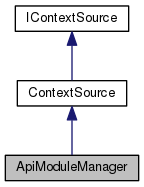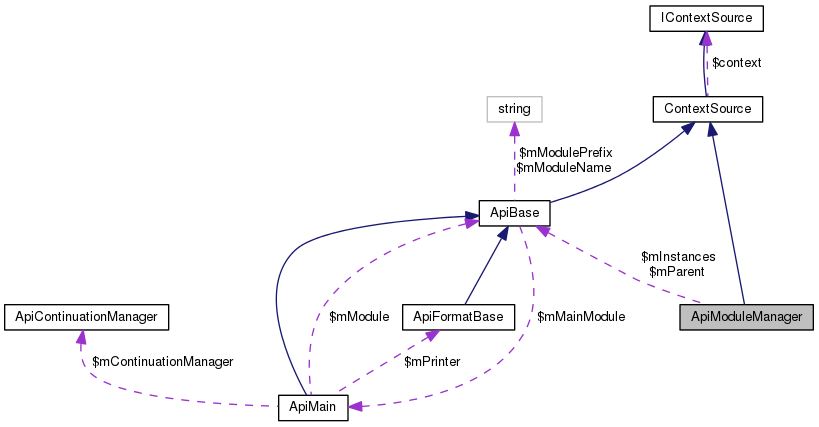This class holds a list of modules and handles instantiation. More...


Public Member Functions | |
| __construct (ApiBase $parentModule) | |
| Construct new module manager. More... | |
| addModule ($name, $group, $class, $factory=null) | |
| Add or overwrite a module in this ApiMain instance. More... | |
| addModules (array $modules, $group) | |
| Add a list of modules to the manager. More... | |
| getClassName ($module) | |
| Returns the class name of the given module. More... | |
| getGroups () | |
| Get a list of groups this manager contains. More... | |
| getModule ($moduleName, $group=null, $ignoreCache=false) | |
| Get module instance by name, or instantiate it if it does not exist. More... | |
| getModuleGroup ($moduleName) | |
| Returns the group name for the given module. More... | |
| getNames ($group=null) | |
| Get an array of modules in a specific group or all if no group is set. More... | |
| getNamesWithClasses ($group=null) | |
| Create an array of (moduleName => moduleClass) for a specific group or for all. More... | |
| isDefined ($moduleName, $group=null) | |
| Returns true if the specific module is defined at all or in a specific group. More... | |
 Public Member Functions inherited from ContextSource Public Member Functions inherited from ContextSource | |
| canUseWikiPage () | |
| Check whether a WikiPage object can be get with getWikiPage(). More... | |
| exportSession () | |
| Export the resolved user IP, HTTP headers, user ID, and session ID. More... | |
| getConfig () | |
| Get the Config object. More... | |
| getContext () | |
| Get the base IContextSource object. More... | |
| getLanguage () | |
| Get the Language object. More... | |
| getOutput () | |
| Get the OutputPage object. More... | |
| getRequest () | |
| Get the WebRequest object. More... | |
| getSkin () | |
| Get the Skin object. More... | |
| getStats () | |
| Get the Stats object. More... | |
| getTiming () | |
| Get the Timing object. More... | |
| getTitle () | |
| Get the Title object. More... | |
| getUser () | |
| Get the User object. More... | |
| getWikiPage () | |
| Get the WikiPage object. More... | |
| msg () | |
| Get a Message object with context set Parameters are the same as wfMessage() More... | |
| setContext (IContextSource $context) | |
| Set the IContextSource object. More... | |
Private Member Functions | |
| instantiateModule ($name, $class, $factory=null) | |
| Instantiate the module using the given class or factory function. More... | |
Private Attributes | |
| null[] | $mGroups = [] |
| ApiBase[] | $mInstances = [] |
| array[] | $mModules = [] |
| ApiBase | $mParent |
Detailed Description
This class holds a list of modules and handles instantiation.
- Since
- 1.21
Definition at line 34 of file ApiModuleManager.php.
Constructor & Destructor Documentation
| ApiModuleManager::__construct | ( | ApiBase | $parentModule | ) |
Construct new module manager.
- Parameters
-
ApiBase $parentModule Parent module instance will be used during instantiation
Definition at line 57 of file ApiModuleManager.php.
Member Function Documentation
| ApiModuleManager::addModule | ( | $name, | |
| $group, | |||
| $class, | |||
$factory = null |
|||
| ) |
Add or overwrite a module in this ApiMain instance.
Intended for use by extending classes who wish to add their own modules to their lexicon or override the behavior of inherent ones.
- Parameters
-
string $name The identifier for this module. string $group Name of the module group string $class The class where this module is implemented. callable | null $factory Callback for instantiating the module.
- Exceptions
-
InvalidArgumentException
Definition at line 126 of file ApiModuleManager.php.
References $factory, and $name.
Referenced by addModules().
| ApiModuleManager::addModules | ( | array | $modules, |
| $group | |||
| ) |
Add a list of modules to the manager.
Each module is described by a module spec.
Each module spec is an associative array containing at least the 'class' key for the module's class, and optionally a 'factory' key for the factory function to use for the module.
That factory function will be called with two parameters, the parent module (an instance of ApiBase, usually ApiMain) and the name the module was registered under. The return value must be an instance of the class given in the 'class' field.
For backward compatibility, the module spec may also be a simple string containing the module's class name. In that case, the class' constructor will be called with the parent module and module name as parameters, as described above.
Examples for defining module specs:
- Parameters
-
array $modules A map of ModuleName => ModuleSpec; The ModuleSpec is either a string containing the module's class name, or an associative array (see above for details). string $group Which group modules belong to (action,format,...)
Definition at line 99 of file ApiModuleManager.php.
References $factory, $name, addModule(), and as.
| ApiModuleManager::getClassName | ( | $module | ) |
Returns the class name of the given module.
- Parameters
-
string $module Module name
- Returns
- string|bool class name or false if the module does not exist
- Since
- 1.24
Definition at line 253 of file ApiModuleManager.php.
| ApiModuleManager::getGroups | ( | ) |
Get a list of groups this manager contains.
- Returns
- array
Definition at line 292 of file ApiModuleManager.php.
| ApiModuleManager::getModule | ( | $moduleName, | |
$group = null, |
|||
$ignoreCache = false |
|||
| ) |
Get module instance by name, or instantiate it if it does not exist.
- Parameters
-
string $moduleName Module name string $group Optionally validate that the module is in a specific group bool $ignoreCache If true, force-creates a new instance and does not cache it
- Returns
- ApiBase|null The new module instance, or null if failed
Definition at line 156 of file ApiModuleManager.php.
References instantiateModule(), and list.
Referenced by ApiDocumentationTest\getSubModulePaths().
| ApiModuleManager::getModuleGroup | ( | $moduleName | ) |
Returns the group name for the given module.
- Parameters
-
string $moduleName
- Returns
- string|null Group name or null if missing
Definition at line 280 of file ApiModuleManager.php.
| ApiModuleManager::getNames | ( | $group = null | ) |
Get an array of modules in a specific group or all if no group is set.
- Parameters
-
string $group Optional group filter
- Returns
- array List of module names
Definition at line 216 of file ApiModuleManager.php.
Referenced by ApiDocumentationTest\getSubModulePaths().
| ApiModuleManager::getNamesWithClasses | ( | $group = null | ) |
Create an array of (moduleName => moduleClass) for a specific group or for all.
- Parameters
-
string $group Name of the group to get or null for all
- Returns
- array Name=>class map
Definition at line 235 of file ApiModuleManager.php.
|
private |
Instantiate the module using the given class or factory function.
- Parameters
-
string $name The identifier for this module. string $class The class where this module is implemented. callable | null $factory Callback for instantiating the module.
- Exceptions
-
MWException
- Returns
- ApiBase
Definition at line 193 of file ApiModuleManager.php.
References $factory, and $name.
Referenced by getModule().
| ApiModuleManager::isDefined | ( | $moduleName, | |
$group = null |
|||
| ) |
Returns true if the specific module is defined at all or in a specific group.
- Parameters
-
string $moduleName Module name string $group Group name to check against, or null to check all groups,
- Returns
- bool True if defined
Definition at line 267 of file ApiModuleManager.php.
Member Data Documentation
|
private |
Definition at line 47 of file ApiModuleManager.php.
|
private |
Definition at line 43 of file ApiModuleManager.php.
|
private |
Definition at line 51 of file ApiModuleManager.php.
|
private |
Definition at line 39 of file ApiModuleManager.php.
The documentation for this class was generated from the following file:
- includes/api/ApiModuleManager.php
